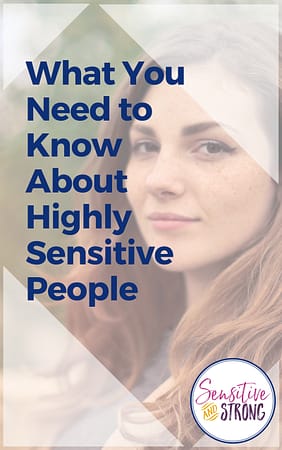What You Need to Know About Highly Sensitive People
“Growing Sensitive & Strong” is the life-changing program that moves you from “What’s wrong with me?” to comfortable and confident in who God made you as a Highly Sensitive Person.
To be the first to know when Early Bird Registration for our summer session begins, you can add yourself to the Waiting List right here.
An Email from a new subscriber says:
Thank you!
I read for the first time in my life of 70 years about the truthfulness of the highly sensitive person!
Most of my life I felt my sensitivity was a negative part of my being, a result of “taking things too personally.”
What joy, freedom, and affirmation I feel in who I truly am!
Even as I reach for a Kleenex, I smile. Although it’s been ten years now, I recall my own joy, freedom, and affirmation upon discovering that being a Highly Sensitive Person is a thing.
I first learned about HSPs while reading Chapter 6 of Susan Cain’s book Quiet: the Power of Introverts in a World that Can’t Stop Talking. I immediately ordered—and devoured—Elaine Aron’s foundational book The Highly Sensitive Person.
After forty-five years of wondering What on earth is wrong with me? discovering that I’m a Highly Sensitive Person changed everything.
I know now that I’m different, not defective.
What It Means to Be Highly Sensitive
Over the last decade years, there’s been an increase in public awareness of what it means to be a Highly Sensitive Person. Popular resources include:
- Oprah (2013) — “Am I Too Sensitive? Highly Sensitive Person Quiz”
- Modern Mrs. Darcy (2014) — “Let’s Talk About Highly Sensitive People“
- Huffington Post (2014) — “16 Habits of Highly Sensitive People” (160,000+ shares!)
- Holley Gerth (2014) — “There’s Something You Should Know About Me”
- Forbes (2016) — “9 Signs You’re a Highly Sensitive Person“
- Introvert, Dear (2016) — “12 Things a Highly Sensitive Person Needs to Thrive”
- Psychology Today (2017) — “Are You a Highly Sensitive Person? Should You Change?“
- BuzzFeed (2017) — “If You’ve Done 21/31 of These Things, You’re Highly Sensitive”
- Medium (2018) — “How to Thrive as a Highly Sensitive Person“
Although sensitivity researcher Elaine Aron‘s books were originally published 15-20 years ago, Amazon rankings show them to be consistently (and increasingly) popular purchases:
- The Highly Sensitive Person: How to Thrive When the World Overwhelms You
- The Highly Sensitive Person In Love: Understanding and Managing Relationships When the World Overwhelms You
- The Highly Sensitive Child: Helping Our Children Thrive When The World Overwhelms Them
If you’re wondering if you might be an HSP, you can take the “Am I a Highly Sensitive Person?” Self-Quiz right here.
What Highly Sensitive People Wish Others Knew
Recently, I asked the members of the Sensitive & Strong Community Cafe, “What’s one thing you wish people understood about HSPs?”
Here are the Top 10 things they had to say.
1) The fact that we’re “sensitive” does not mean we’re “weak”.
While building the Sensitive and Strong website, I brainstormed dozens of belief statements. My drop-the-mic moment came as I wrote the words “I believe that sensitive is another word for strong.”
The ultimate role model for every HSP is Jesus, our sensitive savior, who was anything but weak.
2) It’s not our fault that we’re Highly Sensitive.
We’re not “making this all up” … nor is it “all in our heads.”
20% of the population is biologically wired this way. And in my experience, this number is considerably higher in the church, as HSPs tend to be spiritually sensitive.
Being highly sensitive is actually in our genes.
3) Our sensitivity is not a fault that needs fixing.
HSPs are typically treated as if our sensitivity is a fault that needs to be teased, bullied, or beaten out of us.
Fact is, we don’t need to be healed or changed or fixed.
We need what every person needs: understanding, love, and acceptance.
4) Being HSP does not automatically mean “drama queen”.
Or “attention-seeker”.
Or “cry baby”.
Or “basket case”.
Sensitivity and over-reactivity are two different things.
5) We feel everything deeply.
“Suck it up” and “just get over it” are foreign concepts for most HSPs. We’re not stubbornly resisting sage advice; we truly have no clue how to do either one.
Empathizing is automatic for us, which means that we’re not just processing our own emotions; we’re also absorbing the emotions of everyone around us.
(If this sounds exhausting? It is. See #6.)
6) We need time—sometimes a long time—to process.
Because of the massive amounts of subtle information we’re constantly picking up from the environment and people around us, we need time to process.
Introverted HSPs may prefer to process alone (which can lead others to label us “stuck up” or “stand-off-ish”).
Extraverted HSPs may be verbal processors who seek someone to serve as a sounding board (which can lead to accusations of “over-thinking” or being “stuck in your head”).
Either way, it’s a defining characteristic of Highly Sensitive People to be deep processors.
7) We can be easily overwhelmed by sudden changes and new situations.
There’s a very fine line between exciting and anxiety-provoking for most HSPs. No matter how well-intentioned, admonitions to
- “lighten up”
- “be more flexible”
- “live a little”
generally cause more harm than good.
We HSPs need to learn to “carry our own jam jars” and develop our own go-to practices for self-soothing and self-care.
8) We need to avoid over-stimulation. When it’s unavoidable, we need “down time.”
When we withdraw, it’s not personal. We just need to retreat into quiet solitude for a little while so that we can return with renewed energy.
It’s vital that HSPs learn how to consistently protect our energy and how to regularly recharge when it’s been depleted.
9) We thrive in safe spaces.
Research shows that HSPs fare far worse than most people in “non-nourishing environments.” But on the flip side, we thrive more than most in “nurturing environments.”
This is why HSPs do well to create sanctuaries at home and at work. Spaces where we control the lighting, the textures, the temperature, the sights, smells, and sounds.
10) Our sensitivity is our God-given super-power.
HSPs bring a multitude of positive traits to their relationships, such as
- conscientiousness
- discernment
- insight
- perceptivity
- responsiveness
And we recognize that Jesus is the strength of every tender heart.
Q4U
- If you’re an HSP, what would you add to this list?
- If you’re not an HSP, what question(s) do you have about HSPs?





Cheri, I learned about HSP last year reading a blog that led me to Anne Bogel’s book Reading People. It was more eye-opening to me than any personality test I’ve ever taken. I look forward to diving into your links and learning more. Thanks so much!
If you had to suggest one book for a mother of a highly sensitive person, what would it be? From your blog post I am realizing that I have been trying to train her and correct her and using all the wrong motivations for a highly sensitive person. But I would love to know the right ones to use.
As a non HSP parent who’s just now recognizing a step child with HSP after 16 years I’d first request prayer for healing as I read this I’m broken hearted as I’m seeing how my comments of “you’re just being too sensitive” or seeing her as different needing to be fixed have caused much harm and now a desire for her to no longer want to visit our family, but a question is on the #9 as we are a large family (6 kids total) and the possibility of giving her that is not likely. How else can we cultivate a “safe place” when our home is so different?
Thank you!!! Appreciate your work and combining a Christian perspective~
I would add that an HSP, put into a high-pressure city, and job situation, unable to get away and get out of it can become depressed and/or angry. I lived in a huge, fast-paced city for fifteen years and it made me feel angry and depressed and almost crazy. I thought it was me, I was just not adjusting well. We moved back to our home town, much smaller, with friends and family, and I feel the stress, the anger and depression all going down. I can feel more now without getting overwhelmed.
I wish I had found this article sooner. All my life I’ve been accused of being too sensitive and taking things too personally. I thought it was a weakness to get over (hence the agression and anger) but see that it might be a blessing. Thank you for opening my eyes to a problem I didn’t know how to figure out!
#6 is a big one for me. I tend to have trouble in situations or conversations that require hurried responses. I’m better when I have processing time. That’s probably why I generally communicate better in writing than verbally, unless I’m able to have a conversation with someone who’s not rushing through it like most people seem to do these days. Good, unrushed, courteous conversation can be hard to find.
I would say this applies to us Highly Sensitive Christian men, too!
This encouraged me so much, Cheri! Thank you! Your blog ministers to me every time I read it.
I have one to add to your list (since you asked): Being sensitive does not mean we are emotionally immature.
This week, I realized that I’d spent years buying into the idea that I was somehow unstable, and had allowed “more mature” women to convince me that I needed to grow up and stop taking life so personally. I often told people that I tended to get sucked in by “strong personalities” because I’d been wounded by multiple relationships involving mentor-types (usually older, but sometimes just controlling) who took me under their wings then labelled me needy and “overly sensitive” when I dared show emotions or be honest about how I felt. But some experiences with much kinder people who gave me the freedom to be who I was caused me to see those past hurtful relationships differently–maybe I wasn’t the emotionally immature one! After all, how mature is it to draw someone in only to shame or judge them, or even cut them loose, for being who they are?
I’m sure I have been guilty of emotional immaturity at times, and possibly even been a bit unstable, but as I continue to process all this I realize that what helped me grow up was learning to accept how God wired me.
Thank you again, Cheri! I can’t wait to share this post.
I’ve had very similar experiences and can relate to everything you just described.
Because HSPS process information and events differently, they also get jobs done differently and see their work/calling more intensely.
And thanks, Cheri, for posting this today, especially #3. I have a very hard time not berating myself for being overwhelmed by almost everything!
This is sooooo good! Amen and amen! I finally, finally have what I need to tell people about me. What a relief to know I’m not broken. Thank you!